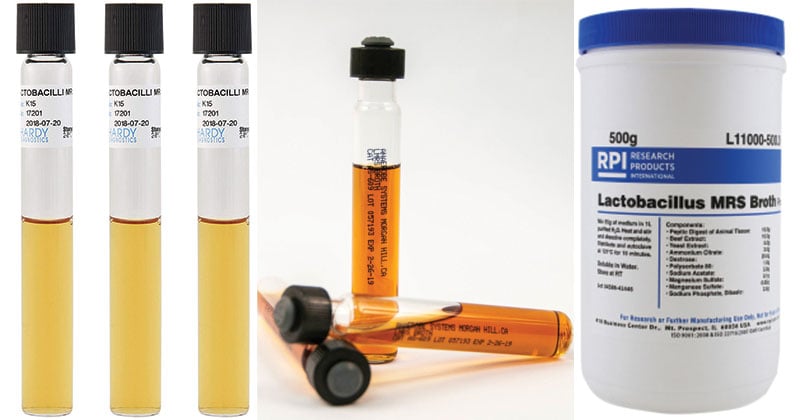Lactobacilli MRS Broth was developed by deMan, et al., to provide luxuriant growth of lactobacilli isolated from oral, fecal, and other specimen sources. Lactobacilli MRS Broth is an improved medium for lactobacilli, it supports good growth and is particularly useful for a number of fastidious strains which grow poorly on other general media.
Interesting Science Videos
Composition of Lactobacilli MRS Broth
| Ingredients | Gms / Liter |
| Proteose peptone | 10.0 |
| Beef extract | 10.0 |
| Yeast extract | 5.0 |
| Dextrose | 20.0 |
| Polysorbate 80 | 1.0 |
| Ammonium citrate | 2.0 |
| Sodium acetate | 5.0 |
| Magnesium sulphate | 0.1 |
| Manganese sulphate | 0.05 |
| Dipotassium phosphate | 2.0 |
Final pH ( at 25°C) 6.5±0.2
Principle of Lactobacilli MRS Broth
Lactobacilli MRS medium, originally developed in 1960 by de Man, Rogosa & Sharpe, are based their formulation with slight modification. The MRS broth contains sources of carbon, nitrogen, and vitamins to support the growth of lactobacilli and other organisms. Proteose peptone and beef extract provide nitrogenous and carbonaceous compounds. Yeast extract provides vitamin B complex and dextrose serves as a carbohydrate and energy source. Polysorbate 80 is a surfactant, facilitating the uptake of nutrients by lactobacilli, supplying fatty acids required for the metabolism of Lactobacilli. It is a selective medium that uses sodium acetate and ammonium citrate to prevent overgrowth by contaminating organisms. Sodium acetate suppresses the growth of many competing bacteria (although some other Lactobacilli, such as Leuconostoc and Pediococcus, may grow). Ammonium citrate inhibits Streptococci, molds, and many other microorganisms. Magnesium sulfate and manganese sulfate provide ions used in metabolism. Growth is considered a positive result. A Durham tube may be added to differentiate Lactobacillus species from Leuconostoc species.
Preparation of Lactobacilli MRS Broth
- Suspend 55.15 grams in 1000 ml distilled water.
- Heat if necessary to dissolve the medium completely.
- Distribute in tubes, bottles or flasks as desired.
- Sterilize by autoclaving at 15 lbs pressure (121°C) for 15 minutes.
Result Interpretation on Lactobacilli MRS Broth

Positive result: Growth, turbidity (Lactobacillus gasseri)
Negative result: No growth (Uninoculated medium)
Uses of Lactobacilli MRS Broth
- MRS Broth is a medium for the cultivation and enumeration of Lactobacillus spp.
- It supports the luxuriant growth of all Lactobacilli from the oral cavity, dairy products, foods, feces, and other sources.
- It is used to determine whether an organism forms gas during glucose fermentation. Some Lactobacillus and Leuconostoc spp. produce gas.
Limitations of Lactobacilli MRS Broth
- It is recommended that biochemical, immunological, molecular, or mass spectrometry testing be performed on colonies from pure culture for complete identification.
- Organisms other than lactobacilli may grow in this media.
- Due to varying nutritional requirements, some strains may be encountered that grow poorly or fail to grow on this medium.
- Lactobacilli MRS Broth is not intended for use in the diagnosis of a disease or other conditions in humans.
References
- Tille P.M. 2014. Bailey and Scott’s diagnostic microbiology. Thirteen edition. Mosby, Inc., an affiliate of Elsevier Inc. 3251 Riverport Lane. St. Louis. Missouri 6304. Page no.217.
- Neogen Corporation
- Conda lab
- Himedia
- Hardy Diagnostics
